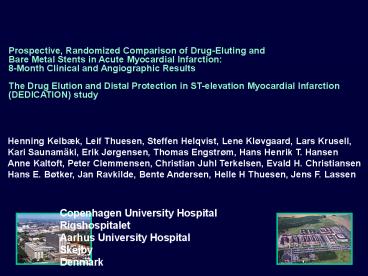PowerPointprsentation PowerPoint PPT Presentation
1 / 30
Title: PowerPointprsentation
1
Prospective, Randomized Comparison of
Drug-Eluting andBare Metal Stents in Acute
Myocardial Infarction8-Month Clinical and
Angiographic Results The Drug Elution and
Distal Protection in ST-elevation Myocardial
Infarction (DEDICATION) study
Henning Kelbæk, Leif Thuesen, Steffen Helqvist,
Lene Kløvgaard, Lars Krusell, Kari Saunamäki,
Erik Jørgensen, Thomas Engstrøm, Hans Henrik T.
Hansen Anne Kaltoft, Peter Clemmensen, Christian
Juhl Terkelsen, Evald H. Christiansen Hans E.
Bøtker, Jan Ravkilde, Bente Andersen, Helle H
Thuesen, Jens F. Lassen
Copenhagen University Hospital Rigshospitalet Aarh
us University Hospital Skejby Denmark
2
Disclosures
- The study has received unrestricted grants from
the Johnson Johnson, Medtronic, Abbott, and
Boston Scientific companies - Otherwise the authors have no disclosures with
- regard to the conduction of this study
3
CEC and Study Coordinators
- Clinical Events Committee
- Lene Holmvang, MD
- John Godtfredsen, MD
- Study Coordinators
- Bettina Løjmand, RN
- Karrina Clausen, RN
4
Study Overview
- In the Drug Elution and Distal Protection in
STEMI (DEDICATION) trial 626 patients were
randomly assigned to receive distal protection or
conventional treatment and to have a DES or a BMS
implanted in the IRA lesion - At 8 months late lumen loss was reduced by 80,
the TLR rate by 60 and the MACE rate by nearly
40 in the DES compared with the BMS group,
although a tendency towards a higher cardiac
death rate deserves further attention - These results indicate that DES efficacy is as
high in STEMI patients as in other patient
categories. Longer term follow-up is needed to
determine DES safety in STEMI
5
Background
- The clinical results of previous trials
evaluating DES vs BMS in patients with STEMI have
not been consistent, and few patients have been
examined with angiography at follow-up
6
Drug-Eluting vs Bare-Metal Stent Implantation
during Primary PCI
Previous published studies with 150 patients
FU 133 170 - 166
endpoint MACCE TVF MACE RS
Invasive
Primary
RS,
MACE,
Study STRATEGY TYPHOON PASSION SESAMI
n 175 712 619 320
DES/BMS 18/32 7/14 9/13 7/17
DES/BMS 8/28 7/20 - 9/21
p 0.001 0.004 0.09 0.03
7
Purpose
- The purpose of this study was to evaluate the
angiographic and clinical results 8 months after
implantation of DES vs BMS in patients with
ST-elevation myocardial infarctions treated with
primary PCI
8
Flow chart
STEMI n626
Randomization
- Distal Protection
Distal Protection
Bare Metal Stent
Bare Metal Stent
Drug Eluting Stent
Drug Eluting Stent
Angiography - QCA
Post Procedure
MACE
1 month
Angiography - QCA / MACE
8 months
9
Flow chart
STEMI n626
Randomization
- Distal Protection
Distal Protection
Bare Metal Stent
Bare Metal Stent
Drug Eluting Stent
Drug Eluting Stent
Angiography - QCA
Post Procedure
MACE
1 month
Angiography - QCA / MACE
8 months
10
Endpoints
Primary Late lumen loss in the IRA lesion
Secondary Binary (gt50) restenosis Major adverse
cardiac events at 8 months Target lesion
revascularization
11
Power Calculation
With a power of 80 and a 2-sided type-1 error of
5 125 patients should be included in each group
to detect a 0.25 mm increase in late lumen loss
with an SD of 0.70 mm. With an expected 25 rate
of patients lost to follow-up, 150 patients
should be included in each arm of the study, that
involved a 2 2 factorial design. Thus, a total
of 600 patients should be included
12
Major inclusion criteria
- Patients who presented with the symptoms and
- signs of a first time large STEMI
- Chest pain 12 hours duration
- ST-elevation gt 4 mm in contiguous leads
- High grade stenosis/occlusion of a native
coronary artery that could possibly be crossed
with a filterwire
13
Major exclusion criteria
- Left main stem stenosis
- Gastrointestinal bleeding within 1 month
- Expected survival lt 1 year
- Linguistic difficulties needing an interpreter
14
Study Flow
Screened patients 1687
Included patients 626
Excluded patients 1061
- 216 Clinically or psychologically
- instability / unconsciousness
- 162 ST-elevation lt 4 mm
- 141 Participation in another study
- 140 Vessel unsuitable for filterwire
- 78 Onset symptoms gt12 hours
- 72 Linguistic problems
- 68 Screening log not filled in
- 58 Previous infarction
- 43 Severe other disease
- 35 Refused to participate
- 26 Significant left main stenosis
- - 22 Other
18 deaths
65 lost for re-angiography
543 patients for re-angiography
608 patients for 8-month clinical
follow-up
15
Number of Patients
STEMI - PPCI n 626
Randomization
Bare Metal Stent n 313
Drug Eluting Stent n 313
16
Baseline clinical characteristics
DES n313
BMS n313
p
17
Baseline lesion characteristics
DES n313
BMS n313
p
0.27
0.33
18
Procedural results
DES n313
BMS n313
p
19
Stent types
DES group Cypher (sirolimus) 47
Taxus (paclitaxel) 40 Endeavor
(zotarolimus) 13 BMS
group Driver/Vision (cobalt) 38
Express/Liberté (stainless steel) 39
Miscellaneous (stainless steel) 23
20
Core lab QCA results
DES n313
BMS n313
p
21
Core lab QCA results
DES n313
BMS n313
p
22
Core lab QCA results
DES n313
BMS n313
p
23
Core lab QCA results
DES n313
BMS n313
p
24
MACE during 8 months
plt0.05
plt0.001
p0.14
p0.09
p0.42
p0.51
infarction
death
25
Freedom from clinically driven TLR
26
Stent Thrombosis at 8 months
ns
27
Conclusion I
- Implantation of DES compared with BMS during
primary PCI results in a significant reduction in
late lumen loss and rate of restenosis in the
target lesion
28
Conclusion II
- The rate of major adverse cardiac events is
reduced in the DES compared with the BMS group. A
tendency towards a higher rate of cardiac
mortality in the DES group requires further
monitoring of the patients
Stent thrombosis is rare in both groups within 8
months, however further observation of this
adverse event is necessary
29
Now presenting
- The scene is yours, Bruce - dont be too harsh !
30
(No Transcript)

